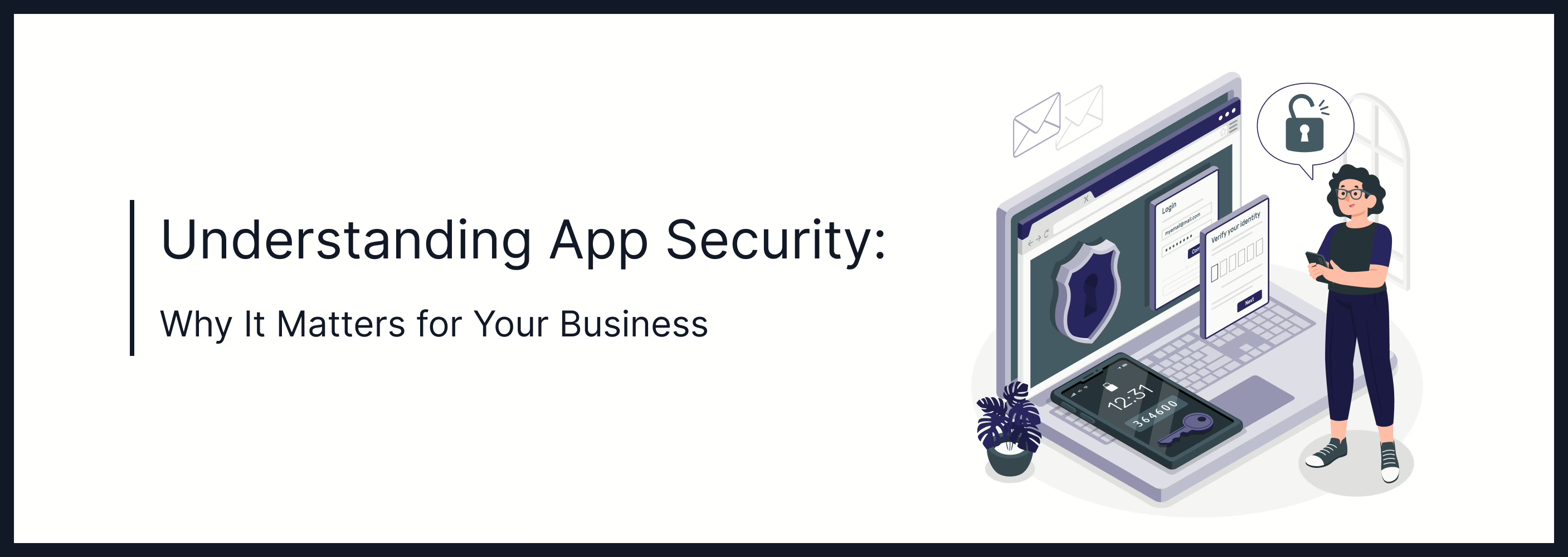
Oct 15, 2024 Information hub
Understanding App Security: Why It Matters for Your Business
In today’s fast-paced digital landscape, mobile and web applications have become an integral part of our daily lives. From banking and shopping to social networking and entertainment, apps are everywhere. However, with the increasing reliance on these applications comes a growing concern: app security. As cyber threats evolve, ensuring the security of applications is no longer optional—it’s a necessity. In this blog post, we will explore the significance of app security, its relevance in today’s world, current trends, challenges, and future developments, as well as practical solutions to enhance app security.
Introduction
In an era where digital transformation is reshaping industries, applications (both mobile and web) have become the backbone of modern business operations. However, as the number of apps grows, so does the risk of cyberattacks. App security refers to the measures taken to protect applications from external threats, such as hacking, data breaches, and malware.
The significance of app security cannot be overstated. A single vulnerability in an app can lead to catastrophic consequences, including financial losses, reputational damage, and legal liabilities. According to a report by IBM Security, the average cost of a data breach in 2021 was $4.24 million, the highest in 17 years. This statistic alone highlights the critical need for robust app security measures.
In this blog, we will delve into the importance of app security, explore common threats, discuss current trends, and provide actionable solutions to safeguard your applications.
The Importance of App Security
The digital world is expanding at an unprecedented rate, with millions of apps being developed and deployed every year. As businesses and individuals increasingly rely on apps for various tasks, the security of these applications becomes paramount. Here are some key reasons why app security is crucial:
- Protection of Sensitive Data: Apps often handle sensitive information such as personal data, financial details, and intellectual property. A breach in app security can lead to the exposure of this data, resulting in identity theft, financial fraud, and other malicious activities.
- Compliance with Regulations: Many industries are governed by strict data protection regulations, such as the General Data Protection Regulation (GDPR) in Europe and the California Consumer Privacy Act (CCPA) in the United States. Non-compliance due to security lapses can result in hefty fines and legal consequences.
- Maintaining User Trust: Users expect their data to be secure when using an app. A security breach can erode trust, leading to a loss of customers and damage to the brand’s reputation.
- Preventing Financial Losses: Cyberattacks can lead to significant financial losses, not only due to the theft of funds but also because of the costs associated with mitigating the breach, compensating affected users, and restoring the app’s functionality.
Common App Security Threats
Understanding the common threats to app security is the first step in protecting your applications. Below are some of the most prevalent security risks that apps face today:
1. Malware
Malware, short for malicious software, is designed to infiltrate and damage systems. In the context of apps, malware can be embedded within the app itself or delivered through external sources, such as phishing emails or compromised websites. Once installed, malware can steal sensitive data, monitor user activity, or even take control of the device.
2. Data Breaches
A data breach occurs when unauthorized individuals gain access to sensitive information stored within an app. This can happen due to vulnerabilities in the app’s code, weak encryption, or poor access controls. Data breaches can have severe consequences, including identity theft, financial fraud, and reputational damage.
3. Insecure APIs
Application Programming Interfaces (APIs) are essential for enabling communication between different software components. However, if APIs are not properly secured, they can become a gateway for attackers to access sensitive data or manipulate the app’s functionality. Insecure APIs are a common target for cybercriminals, as they often expose critical data and services.
4. Poor Authentication and Authorization
Weak authentication mechanisms, such as simple passwords or lack of multi-factor authentication (MFA), can make it easier for attackers to gain unauthorized access to an app. Similarly, improper authorization controls can allow users to access data or perform actions they shouldn’t be able to, leading to potential security breaches.
Current Trends in App Security
As cyber threats continue to evolve, so do the strategies and technologies used to combat them. Here are some of the current trends shaping the future of app security:
1. Zero Trust Architecture
The Zero Trust security model operates on the principle of “never trust, always verify.” In this approach, no user or device is trusted by default, even if they are inside the network perimeter. Instead, continuous verification is required to access resources. This model is gaining traction as it helps mitigate the risks associated with insider threats and lateral movement within a network.
2. AI and Machine Learning in Security
Artificial Intelligence (AI) and Machine Learning (ML) are being increasingly used to enhance app security. These technologies can analyze vast amounts of data to identify patterns and detect anomalies that may indicate a security threat. For example, AI-powered security tools can detect unusual login attempts or identify malware before it causes damage.
3. DevSecOps
DevSecOps is the integration of security practices into the DevOps process. Traditionally, security was considered a separate phase in the software development lifecycle. However, with DevSecOps, security is integrated from the very beginning, ensuring that vulnerabilities are identified and addressed early in the development process. This approach helps reduce the risk of security issues being discovered after the app has been deployed.
Challenges in App Security
While advancements in technology have improved app security, several challenges remain:
- Rapid Development Cycles: In today’s competitive market, businesses are under pressure to release apps quickly. This often leads to security being overlooked in favor of speed, resulting in vulnerabilities that can be exploited by attackers.
- Complexity of Modern Apps: Modern apps are often built using a combination of third-party libraries, APIs, and cloud services. This complexity increases the attack surface and makes it more difficult to secure the app.
- Lack of Security Awareness: Many developers and organizations lack the necessary knowledge and training to implement robust security measures. This can lead to common security mistakes, such as hardcoding credentials or failing to encrypt sensitive data.
Best Practices for App Security
To mitigate the risks associated with app security, organizations should adopt the following best practices:
1. Secure Coding Practices
Developers should follow secure coding practices to minimize the risk of introducing vulnerabilities into the app. This includes:
- Input Validation: Ensure that all user inputs are properly validated to prevent injection attacks, such as SQL injection or cross-site scripting (XSS).
- Error Handling: Implement proper error handling to prevent attackers from gaining insights into the app’s internal workings.
- Code Reviews: Conduct regular code reviews to identify and fix security issues before they can be exploited.
2. Encryption
Encryption is essential for protecting sensitive data, both at rest and in transit. Organizations should use strong encryption algorithms, such as AES-256, to ensure that data cannot be easily intercepted or decrypted by attackers.
3. Regular Security Audits
Regular security audits and penetration testing can help identify vulnerabilities in the app before they are exploited by attackers. These audits should be conducted by experienced security professionals who can provide recommendations for improving the app’s security posture.
4. Multi-Factor Authentication (MFA)
Implementing Multi-Factor Authentication (MFA) adds an extra layer of security by requiring users to provide two or more forms of verification before accessing the app. This can significantly reduce the risk of unauthorized access, even if a user’s password is compromised.
Case Studies: App Security Breaches
To understand the real-world impact of app security breaches, let’s take a look at two high-profile cases:
1. Facebook Data Breach (2019)
2. Equifax Data Breach (2017)
The Future of App Security
As technology continues to evolve, so will the threats to app security. Here are some developments we can expect to see in the future:
- Quantum Computing: While quantum computing holds great promise, it also poses a threat to current encryption methods. Organizations will need to develop quantum-resistant encryption algorithms to protect their data in the future.
- Increased Regulation: Governments around the world are introducing stricter regulations to protect user data. Organizations will need to stay up to date with these regulations and ensure that their apps comply with the latest security standards.
- Automated Security Tools: As AI and ML continue to advance, we can expect to see more automated security tools that can detect and respond to threats in real-time, reducing the need for manual intervention.
Conclusion
In conclusion, app security is a critical aspect of modern digital life. As apps become more integrated into our daily routines, the need to protect them from cyber threats becomes increasingly important. By understanding the common threats, staying informed about current trends, and implementing best practices, organizations can significantly reduce the risk of security breaches.
Key takeaways include:
- Prioritize security from the start by adopting secure coding practices and integrating security into the development process (DevSecOps).
- Regularly audit and test your apps for vulnerabilities.
- Implement strong encryption and multi-factor authentication to protect sensitive data.
- Stay informed about emerging threats and technologies, such as AI and quantum computing, to future-proof your app security.
By taking a proactive approach to app security, businesses can protect their users, maintain trust, and avoid the costly consequences of a security breach.
